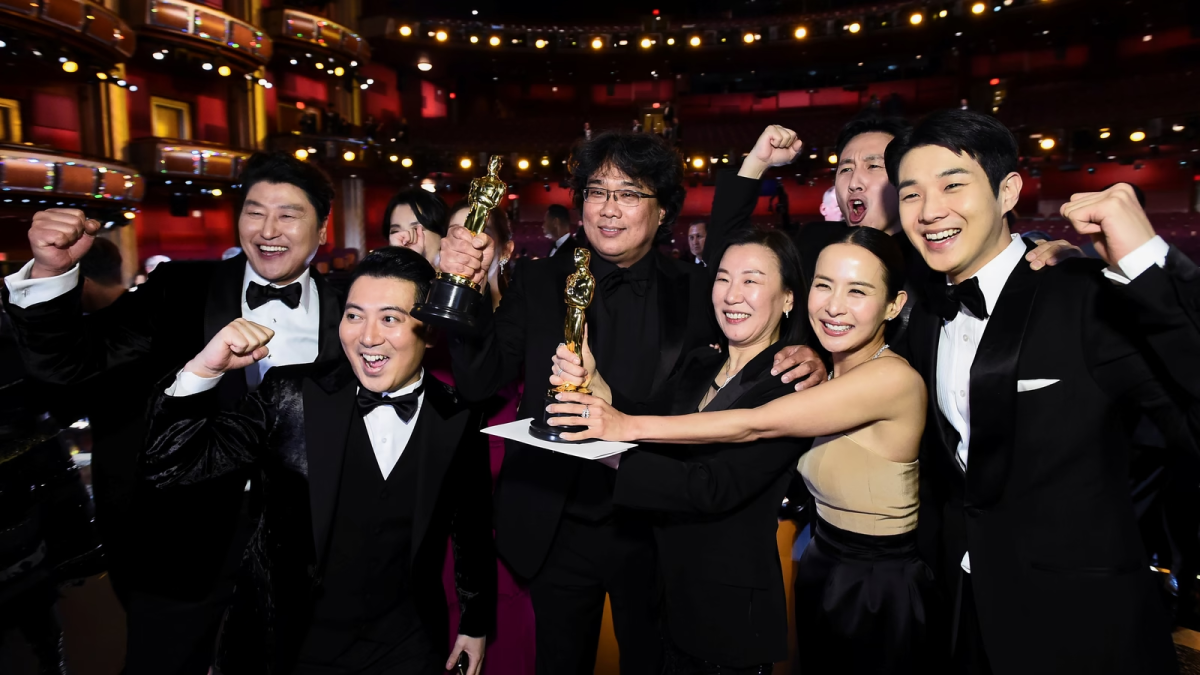Cheers echoed throughout the 92nd Oscars as Parasite (2019) absolutely swept, winning four Academy awards, including Best Picture. It was not only the first South Korean film to receive Academy recognition, but also the first non-English film to win Best Picture (the first in 92 years… but that’s another discussion). Although Parasite has introduced South Korean cinema to a broader audience, the history behind it goes much further than what the Western, mainstream media provides.
From 1910 to 1945, Korea was occupied by Japan; forced to adapt to Japan’s culture and rules, most of Korean history during this period is lost, including many movies from this time. After Japan surrendered, Korea was immediately split into the North and South, and when the Korean War began soon after, the country only grew more unstable. Families were divided, millions of people died, and the economy was in ruins. Even when the war ended, true peace was not achieved, as the struggle between the Koreas continues to this day. Despite this, South Korea was finally able to breathe… Is what one might think. Instead, the government entered an era of a repressive, corrupt military dictatorship. As people protested and spoke out against the administration, especially university students, they were brutally silenced and censored. However, after Chun Doo-hwan’s rule ended in 1988, South Korea was now finally able to slowly develop into a country of democracy and freedom, and as the movement for democratization died down after the victory, much of this passion didn’t just disappear.
In Yellow Door: ‘90’s Lo-fi Film Club (2023), a documentary about Bong Joon-ho’s university film club, Bong says that “it was like all these cinephiles who’d been hiding suddenly start[ed] spilling out into the streets… I think it had something to do with the craziness of the ‘90s.” With a new era drawing in, the once oppressed culture was finally able to prosper, leading to a new cinephile culture in South Korea. Everything regarding movies just got bigger and bigger, including the box office. As the love for movies grew larger in South Korea, the South Korean cinema industry also grew into something new.
This era of alleviated censorship allowed Korean directors to finally be (mostly) free from the hands of the government, and in the late 80s through 90s, the Korean New Wave emerged. Many of the movies during this period provided social commentary on Korea – nuanced stories with themes like rapid westernization, class struggles, and the division of Korea were introduced. Films like Chilsu and Mansu (1988) and Peppermint Candy (1999) addressed the current turmoil South Korea was facing at the time and looked at how South Korean society was progressing.
Since then, the South Korean film industry has flourished. Thrillers like Oldboy (2003), Memories of Murder (2003), and of course, Parasite, have all helped bring foreign acclaim to the South Korean film industry, but this ignores the long list of South Korean gems that span across genres.
Some of my personal favorites include:
- One Fine Spring Day (2001)
- Wishing Stairs (2003)
- Hello Ghost (2010)
- Burning (2018)
When asked about their favorite Korean movie, Alyssa Rim, 12, replied with A Werewolf Boy (2012). “It’s about a girl and her family living on a farm when suddenly a werewolf boy shows up. At first, he’s really rowdy but she teaches him how to interact with other humans,” Rim explains. “It can be a little corny, but the movie is really heartwarming and romantic. It incorporates these fairytale elements into an “old-timey” setting which creates a really interesting, dreamy atmosphere.”
“Unlocked (2023) made me scared of my phone for a day or two,” exclaimed Tahseen Azad, 12, when asked about her favorite Korean movie. “[It’s] a movie about a dude who repairs phones but installs programs in them to stalk people (mostly women) and see the whole contents of their phone and through their camera. He pinpoints their location after enjoying the pervy stuff for a while and then goes to kill them.” The male lead, played by Im Si-wan was Azad’s favorite element of the movie: “[He] usually works in slice of life or romance shows, so I was super skeptical when I heard he was playing a serial killer. When I watched the movie though, I could feel the psychopath vibes just from his eyes and his victims screamed really realistically.”
It took a long time for South Korea to become what it is today. The collective trauma and passion continues to linger throughout the culture, as the South Korean cinema industry also continues to grow and develop as a reflection of its influence in the world. Whether it be thriller or romance, South Korean movies have it all. If you’ve never watched any Korean films before, it’s never too late to expand your horizons and explore beyond what you’re used to. As director Bong said, “Once you overcome the 1-inch-tall barrier of subtitles, you will be introduced to so many more amazing films.”











